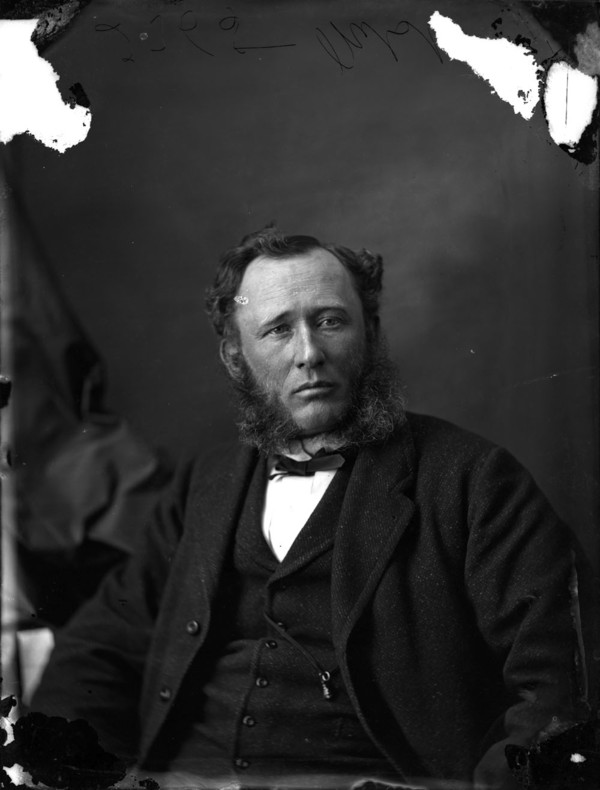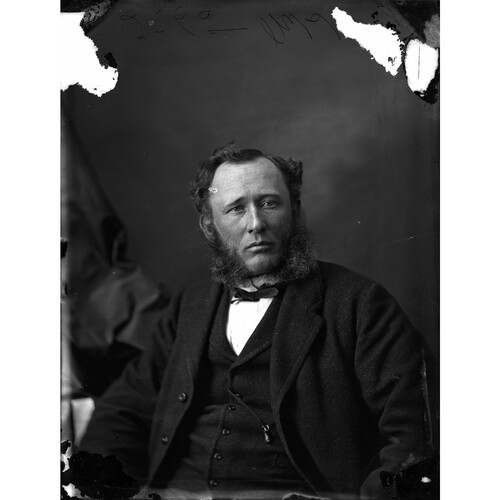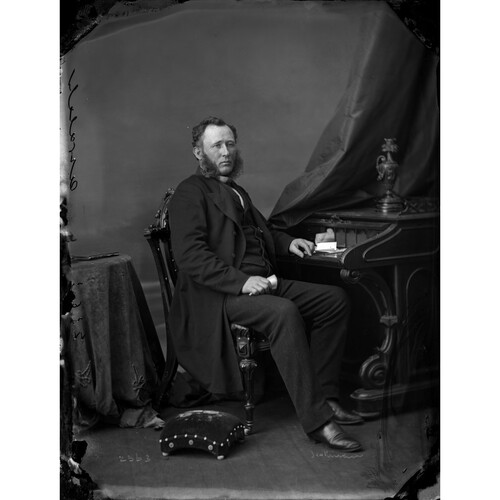WALSH, AQUILA, civil engineer, politician, and civil servant; b. 15 May 1823 in Charlotteville Township, Upper Canada, second son of Francis Leigh (Legh) Walsh; m. 21 Nov. 1850 Jane Wilson Adams, and they had a son and four daughters; d. 6 March 1885 at Winnipeg, Man.
Aquila Walsh’s grandfather, Thomas Leigh (Legh) Walsh, uel, came in 1793 to Upper Canada where he was a provincial land surveyor, and from 1796 to 1810 the registrar of deeds for Norfolk County. Aquila’s father, Francis Leigh Walsh, fought in the War of 1812, served as registrar of Norfolk County from 1810 until his death in 1884, and represented Norfolk in the House of Assembly of Upper Canada between 1824 and 1828 and in 1835–36.
Following his education at the London District Grammar School, Aquila Walsh became a civil engineer at Simcoe and a partner in the firm of Walsh and Mercer, provincial land surveyors and civil engineers. In 1848 he became deputy registrar of Norfolk County and retained that position until 1861 when he was elected to represent the county in the Legislative Assembly of the Province of Canada. He was reelected in 1863.
A staunch supporter of the Conservative party throughout his life, Walsh persistently sought political rewards for his loyalty and was resentful and bitter when ignored. He was elected to the House of Commons in 1867 and hoped to become its first speaker. “Few of your supporters,” he wrote to Sir John A. Macdonald* in October 1867, “have entered or remained in public life at a greater inconvenience or sacrifice than myself and none have received less in the way of consideration or promotion.” In 1868 he was appointed chairman of the Intercolonial Railway Commission, a post he held until 1874. He sought to be a cabinet minister, superintendent of government railways, chairman of a commission on the Pacific railway in 1879, a senator, and lieutenant governor of Manitoba. When others were given recognition he protested, for example in 1879 when he again pointed to what he claimed to be extraordinary sacrifices in time, money, and business for the party.
Walsh was unsuccessful in Norfolk North in the elections of 1872 and 1878; he did not run in 1874, and his support for the Conservative candidate in the riding was not effective. He had ceased to control his constituency; his political usefulness was over However, his protests and “naggings” about his services continued. In 1882, shortly after he became mayor of Simcoe, he finally received a response.
Macdonald, as minister of the interior, noted in October 1881 that when this department was organized in 1873 the settlement of the west had barely begun. The construction of the Canadian Pacific Railway had provided an impetus to settlement, and the resulting increase in the volume of business connected with the administration of lands made it “absolutely necessary” to have an officer stationed in Winnipeg. Walsh was appointed commissioner of crown lands on 4 Feb. 1882, to take charge of the land-granting, timber, and mining business of the department in Manitoba and the North-West Territories.
Walsh was a conscientious, popular, and able officer. Yet he had personal reservations about the position. He complained that, having previously neglected his business for politics, he could not now “do credit” to his social position on his salary. He resented the fine home which the Hudson’s Bay Company provided for its land agent, Charles John Brydges, and Brydges’ “impertinence” in writing his long-time confidant Macdonald about land matters. Walsh was also annoyed that local patronage was controlled by the department in Ottawa. Having served as commissioner for just three years, Walsh died in March 1885.
Eva Brook Donly Museum (Simcoe, Ont.), Norfolk Hist. Soc. coll., Walsh papers (mfm. at PAC). PAC, MG 26, A; RG 15, DII, 1, v.266, file 38372. British Canadian (Simcoe), 11 March 1885. Manitoba Daily Free Press, 9 March 1885. Canadian directory of parl. (J. K. Johnson). “Thomas William Walsh,” Assoc. of Ontario Land Surveyors, Annual report (Toronto), 34 (1919): 86–87.
Cite This Article
Hartwell Bowsfield, “WALSH, AQUILA,” in Dictionary of Canadian Biography, vol. 11, University of Toronto/Université Laval, 2003–, accessed December 31, 2025, https://www.biographi.ca/en/bio/walsh_aquila_11E.html.
The citation above shows the format for footnotes and endnotes according to the Chicago manual of style (16th edition). Information to be used in other citation formats:
| Permalink: | https://www.biographi.ca/en/bio/walsh_aquila_11E.html |
| Author of Article: | Hartwell Bowsfield |
| Title of Article: | WALSH, AQUILA |
| Publication Name: | Dictionary of Canadian Biography, vol. 11 |
| Publisher: | University of Toronto/Université Laval |
| Year of publication: | 1982 |
| Year of revision: | 1982 |
| Access Date: | December 31, 2025 |





